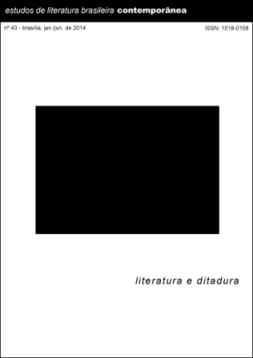Na sala de edição:
“Mãe judia, 1964”, de Moacyr Scliar
DOI:
https://doi.org/10.1590/S2316-40182014000100006Abstract
Tentativas de cobrir responsabilidades dos crimes da ditadura e de alterar ou silenciar a força dos depoimentos de vítimas de violência continuam a se manifestar no Brasil contemporâneo. O propósito deste artigo é mostrar como o texto “Mãe judia, 1964”, de Moacyr Scliar, ilumina, sob a aparência de conto de aprendizagem e de monólogo de uma doente mental, uma prática violenta que, sem deixar marcas em suas vítimas, teve efeitos graves e duradouros na sociedade brasileira. O processo de normalização, através das armas da persuasão, da banalização e do silêncio, de um recente passado traumático, é mostrado aos leitores como reconhecível e por isso contrastável.
References
CONY, Carlos Heitor (2004). A revolução dos caranguejos. São Paulo: Companhia das Letras.
CRIMES da ditadura (2012). Caminhos da reportagem, Brasília: TV Brasil, 10 de outubro. Programa de TV. Disponível em: < http://goo.gl/KNLQCA >. Acesso em: 5 abr. 2014.
DYER, BRENDA (2008). Winter tales: comedy and romance story-types in narratives of depression. In: CLARK, Hilary (ed.). Depression and narrative: telling the dark. Albany: State University of New York Press.
FRANK, Arthur W. (2013[1995]). The wounded storyteller: body, illness and ethics. Chicago: University of Chicago Press.
GINZBURG, Jaime (2012a). Escritas da tortura. In: Crítica em tempos de violência. São Paulo: Edusp.
______ (2012b). Memória da ditadura em Caio Fernando Abreu e Luis Fernando Veríssimo. In: Crítica em tempos de violência. São Paulo: Edusp.
________ (2012c). O narrador na literatura brasileira contemporânea. Tintas: Quaderni di letterature iberiche e iberoamericane, Milão, n. 2, p. 199-221.
SCLIAR, Moacyr (1980). O centauro no jardim. São Paulo: Companhia das Letras.
______ (2004). Mãe judia, 1964. São Paulo: Companhia das Letras.
SELIGMANN-SILVA, Márcio (2003). Introdução. In: SELIGMANN-SILVA, Márcio (org.) História, memória, literatura: o testemunho na era das catástrofes. Campinas: Editora da Unicamp.
VENTURA, Zuenir (2004). Um voluntário da pátria. São Paulo: Companhia das Letras.
VERÃSSIMO, Luis Fernando (2004). A mancha. São Paulo: Companhia das Letras.
VIEIRA, Nelson (2009). Contemporary jewish writing in Brazil: an anthology. Lincoln: University of Nebraska Press.
ZILBERMAN, Regina (2013). Leitura prazerosa sobre a saúde. In: SCLIAR, Moacyr. Território da emoção: crônicas de medicina e saúde. São Paulo: Companhia das Letras.
Downloads
Published
Issue
Section
License
Authors who publish in this journal agree to the following terms:
a) The authors maintain the copyright and grant the journal the right of first publication, the work being simultaneously licensed under the Creative Commons Attribution License-Non Commercial 4.0 which allows the sharing of the work with acknowledgment of the authorship of the work and publication this journal.
b) Authors are authorized to enter into additional contracts separately, for non-exclusive distribution of the version of the work published in this journal (eg publish in institutional repository or as a book chapter), with authorship recognition and publication in this journal.
c) Authors are allowed and encouraged to publish and distribute their work online (eg in institutional repositories or on their personal page) after the editorial process, as this can generate productive changes, as well as increase the impact and citation of published work (See The Effect of Free Access).
d) The authors of the approved works authorize the magazine to, after publication, transfer its content for reproduction in content crawlers, virtual libraries and the like.
e) The authors assume that the texts submitted to the publication are of their original creation, being fully responsible for their content in the event of possible opposition by third parties.


